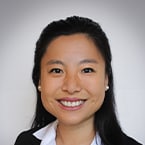AACR-Genentech Research Fellowships
The AACR-Genentech Research Fellowships represent a joint effort to encourage and support postdoctoral or clinical research fellows to conduct cancer research and to establish a successful career path in this field. Funded research can be in basic, translational, clinical, or population sciences.
2024 Grantees

Research
Significant racial disparities exist in multiple myeloma (MM) and its precursor stages, where a 2-3 fold higher incidence is observed among Black individuals compared to non-Hispanic White individuals. Dr. Kim aims to discover germline risk alleles or genes that are strongly associated with MM precursor stages (as detected by mass spectrometry) in 8,000 individuals (including 2,500 Black individuals) from the Mass General Brigham Biobank cohort. Firstly, associations between MM precursors, inferred genetic ancestry, and polygenic risk score from all mass spectrometry-screened participants based on genotype data will be evaluated. Secondly, candidate risk alleles, genes, or HLA that are significantly associated with phenotypes will be identified. Lastly, these findings will be validated in other available data and cohorts of African individuals.
Biography
Dr. Kim received an undergraduate degree in Biomedical Science from the Imperial College London in 2014 and a doctorate in Biomedical Science from Seoul National University, College of Medicine in 2022. During his doctoral studies, he contributed to multiple research efforts in precision medicine, utilizing various types of sequencing data. He joined the Broad Institute as a postdoctoral associate in 2023, where he focuses on the biological understanding of potential precursor stages of MM and the underlying germline risks that contribute to its development.
Acknowledgment of Support
“I am honored and grateful to receive the AACR-Genentech Cancer Disparities Research Fellowship. I hope that this study will enhance the understanding of racial disparities in multiple myeloma and its precursor stages. This opportunity will advance my research career and enable me to become an independent researcher.”

Research
Hepatocellular carcinoma (HCC) often fails to respond to conventional T-cell based immunotherapies. Dendritic cells (DCs) can induce anti-tumor T cell responses, making them an attractive immunotherapeutic target. The addition of the oxidized phospholipid PGPC can stimulate a “hyperactive” DC (hDC) state, resulting in more robust and durable T cell responses. Dr. Cao has demonstrated that hDCs are recruited to the tumor proper and are associated with an enrichment of intra-tumoral antigen-specific CD8+ T cells and durable T cell-mediated IFNy production. She seeks to leverage the innate immune system to develop a novel treatment strategy against HCC.
Biography
Dr. Cao obtained her undergraduate degree in molecular biology from Cornell University. As part of her pursuit of her medical and doctoral degrees at the Albert Einstein College of Medicine, she studied the role of the atypical cadherin Fat1 in regulating vascular smooth muscle cell growth after vascular injury. She is currently an advanced fellow in Pediatric Inflammatory Bowel Disease at Boston Children’s Hospital (BCH), where she is studying the role of innate immunity in hepatocellular carcinoma.
Acknowledgment of support
“This fellowship supports my career goal of becoming a physician-scientist. I am interested in studying the complex interaction between immune cells within the tumor microenvironment, and to elucidate molecular pathways that can be leveraged for novel immunotherapies against cancers that are typically resistant to conventional treatments, such as hepatocellular carcinoma.”